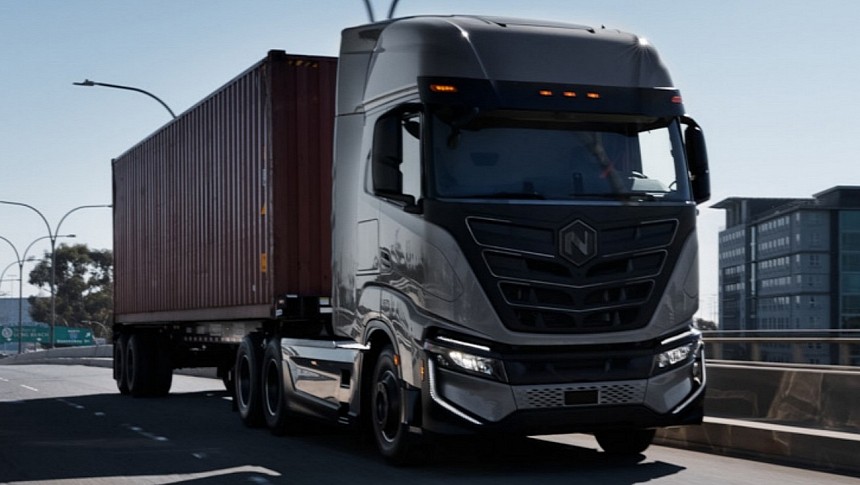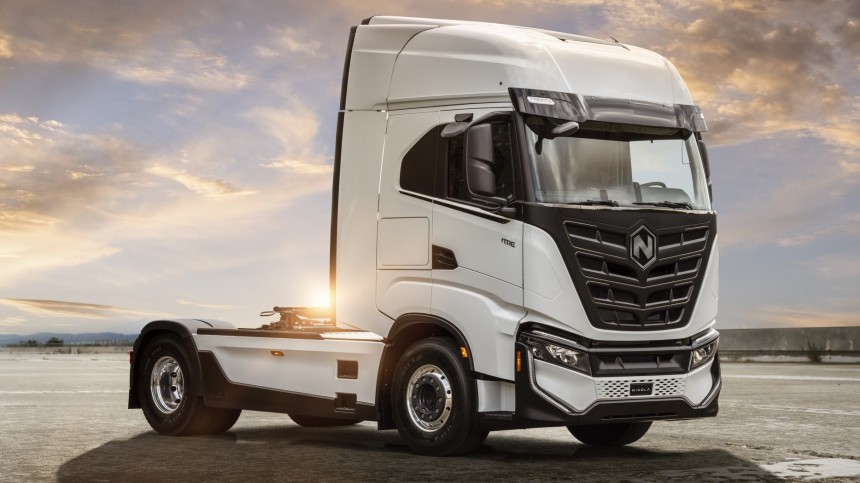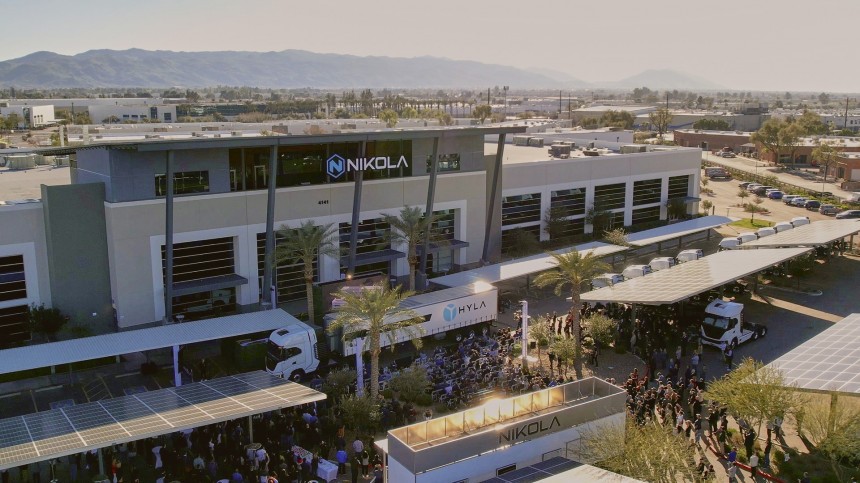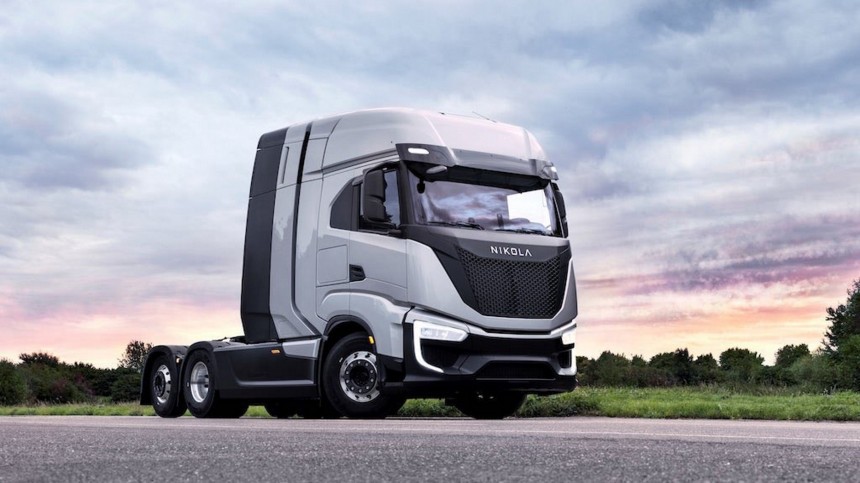A blaze on June 23 destroyed five Tre BEV trucks at Nikola's headquarters in Phoenix. At first, the company said it suspected foul play because of a vehicle parked nearby that left soon after the fire started. However, Electrek revealed that Romeo Power battery packs could have cells that corroded and self-discharged, a malfunction that could cause a blaze. Nikola denied that this was the problem and announced on August 11 that it would recall 209 units of the Tre BEV due to a coolant leak – or all the trucks it has delivered so far.
Nikola is filing the voluntary recall with the National Highway Traffic Safety Administration (NHTSA). According to the company, the trucks may still operate as long as the owners take some precautions. The truck maker asked its customers to park the trucks outside any facility "to allow for over-the-air updates and better connectivity with Fleet Command, Nikola's truck monitoring system." Another obvious benefit would be that they would not affect anything else should they catch on fire. General Motors made a similar request when the Chevrolet Bolt EV fires started, but it was more explicit about the reasons.
The battery electric truck (BET) manufacturer also advised its clients to keep the Main Battery Disconnect (MBD) function turned on at all times. That would "enable real-time vehicle monitoring and safety systems operation." The idea is that this resource will detect and prevent any problem caused by an eventual coolant leak.
According to Nikola, Exponent helped it discover the probable cause for the fire. The third-party investigator disclosed on August 10 that leaking coolant in a single battery pack was to blame. The Tre BEV has nine battery packs for a total of 733 kWh. Coincidence or not, a "minor thermal incident" with "an engineering validation truck" parked at Nikola's plant in Coolidge (63 miles from the Phoenix headquarters) happened on the same day. The BET maker said the other fire confirmed that the coolant leak was the problem's cause. Nikola's own investigations determined that the issue was related to a single supplier, but it did not through them under the bus and protected its identity. The proposed repair will be announced in the next few weeks.
Nikola did not disclose if all the trucks it ever sold are involved, but its numbers confirm that. In 2022 – when Nikola started deliveries – the first 131 BETs reached their buyers. In 2023, that number increased by 76 units, meaning that the 207 Tre BEVs handed to buyers until the end of Q2 2023 were joined by two more in July and August.
Nikola knows how harmful this can be to its image. Unlike older truck manufacturers, the startup is still trying to prove it can create reliable products that will save money for its customers while avoiding carbon emissions. That is why it stressed it is taking all possible measures for no customer to have issues with this coolant leak. The company's new CEO ensured Nikola would be transparent about what happened. Steve Girsky also said that the BET maker takes safety very seriously. Nikola was also careful enough to describe all the steps it took to test and validate the truck and its battery packs.
The Tre BEV allegedly "meets and exceeds FMVSS and UN GTR 20 government regulations." Nikola said it submitted the truck "to front, side, rear, and rollover crash testing." Curiously, "battery coolant leakage monitoring, battery thermal runaway detection, and high-voltage interlock loop fault detection" were also analyzed. Why the leak was not detected at that stage is something that Nikola shall try to explain in the future. Theoretically, those evaluations should have revealed any failures when Nikola performed them back in the Tre BEV's testing phase.
If the leak only showed up after use or even several miles after it started, the first fire case would not have happened with recently produced trucks, as those parked in Phoenix seemed to be. It may also be the case that the BET that started the blaze was "an engineering validation truck," but Nikola would have talked about it. Hopefully, the company's future updates will address that.
While the repair is in development, Nikola will halt Tre BEV's sales. It makes sense: apart from fixing the BETs already in the hands of its customers, the company wants to be sure the ones yet to get in their hands and to be produced will not offer the same risks. The BET maker also rushed to ease the minds of Tre FCEV's buyers. The electric truck powered by hydrogen started leaving production lines on July 31.
Nikola wanted everybody to know that the new "truck's battery pack has a different design," which means that the coolant leak does not affect the hydrogen-powered vehicle. Although it does not rely solely on battery packs, the Tre FCEV has two units delivering a total of 164 kWh. They are necessary to start the truck and also to harness the energy from regenerative braking. The fuel cells work to charge these battery packs and also to deliver electricity to the e-axle that powers the truck.
Do these battery packs have the same supplier involved with the leakage? That's something else the BET maker may want to disclose. If you think it through, Nikola has wanted to sell fuel-cell vehicles since its foundation, but the carbon-neutral transportation business is more widespread. When the company went under new management, its executives probably decided to explore all possibilities. That would have been a wise decision if the execution was flawless. With this recall, we'll have to wait for the reputation impacts to determine if that choice did not hurt the company. Nobody can say Nikola is not doing its homework.
The battery electric truck (BET) manufacturer also advised its clients to keep the Main Battery Disconnect (MBD) function turned on at all times. That would "enable real-time vehicle monitoring and safety systems operation." The idea is that this resource will detect and prevent any problem caused by an eventual coolant leak.
According to Nikola, Exponent helped it discover the probable cause for the fire. The third-party investigator disclosed on August 10 that leaking coolant in a single battery pack was to blame. The Tre BEV has nine battery packs for a total of 733 kWh. Coincidence or not, a "minor thermal incident" with "an engineering validation truck" parked at Nikola's plant in Coolidge (63 miles from the Phoenix headquarters) happened on the same day. The BET maker said the other fire confirmed that the coolant leak was the problem's cause. Nikola's own investigations determined that the issue was related to a single supplier, but it did not through them under the bus and protected its identity. The proposed repair will be announced in the next few weeks.
Nikola knows how harmful this can be to its image. Unlike older truck manufacturers, the startup is still trying to prove it can create reliable products that will save money for its customers while avoiding carbon emissions. That is why it stressed it is taking all possible measures for no customer to have issues with this coolant leak. The company's new CEO ensured Nikola would be transparent about what happened. Steve Girsky also said that the BET maker takes safety very seriously. Nikola was also careful enough to describe all the steps it took to test and validate the truck and its battery packs.
The Tre BEV allegedly "meets and exceeds FMVSS and UN GTR 20 government regulations." Nikola said it submitted the truck "to front, side, rear, and rollover crash testing." Curiously, "battery coolant leakage monitoring, battery thermal runaway detection, and high-voltage interlock loop fault detection" were also analyzed. Why the leak was not detected at that stage is something that Nikola shall try to explain in the future. Theoretically, those evaluations should have revealed any failures when Nikola performed them back in the Tre BEV's testing phase.
While the repair is in development, Nikola will halt Tre BEV's sales. It makes sense: apart from fixing the BETs already in the hands of its customers, the company wants to be sure the ones yet to get in their hands and to be produced will not offer the same risks. The BET maker also rushed to ease the minds of Tre FCEV's buyers. The electric truck powered by hydrogen started leaving production lines on July 31.
Do these battery packs have the same supplier involved with the leakage? That's something else the BET maker may want to disclose. If you think it through, Nikola has wanted to sell fuel-cell vehicles since its foundation, but the carbon-neutral transportation business is more widespread. When the company went under new management, its executives probably decided to explore all possibilities. That would have been a wise decision if the execution was flawless. With this recall, we'll have to wait for the reputation impacts to determine if that choice did not hurt the company. Nobody can say Nikola is not doing its homework.
















